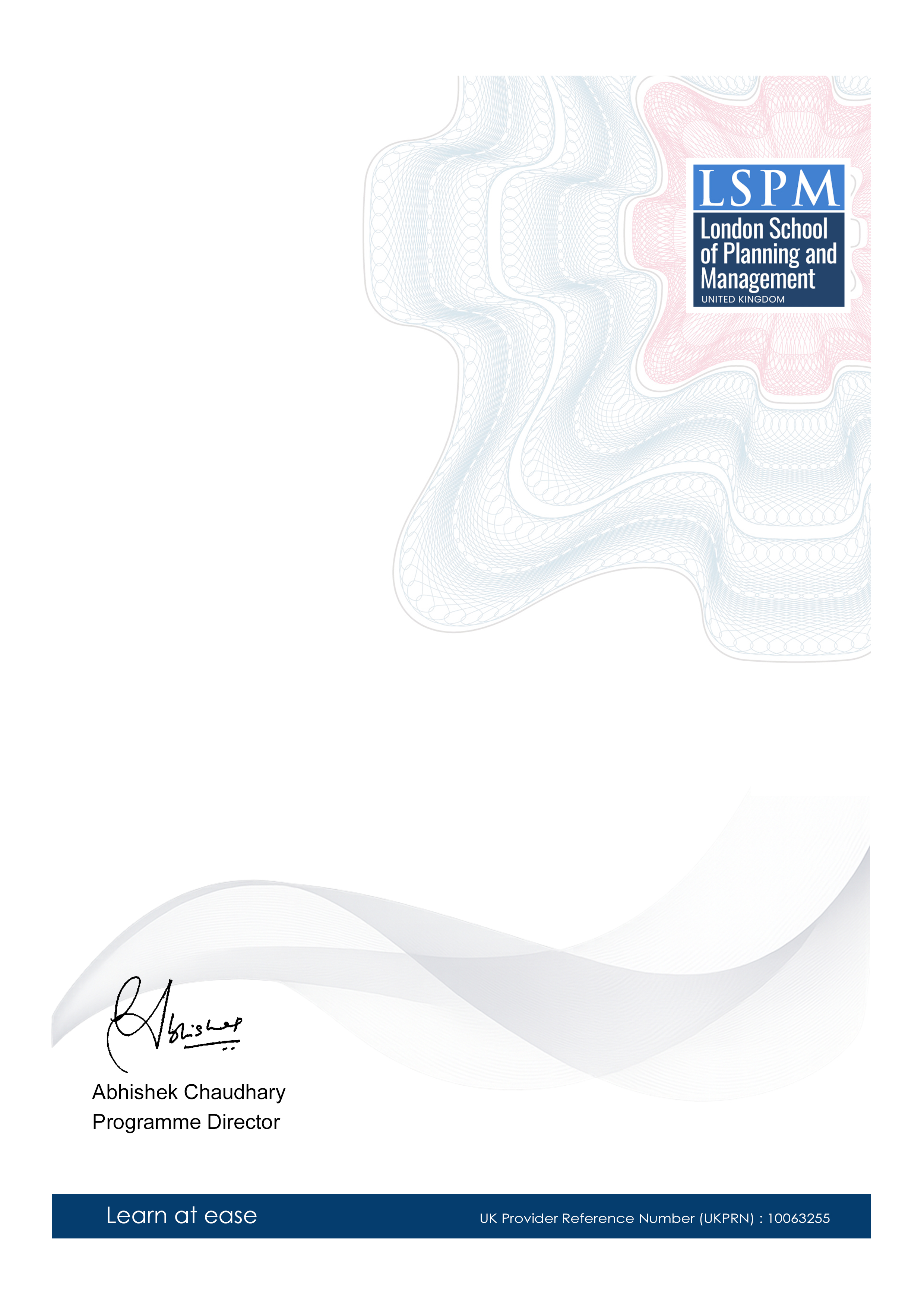Global Certificate Course in LGBTQ+ Yoga Therapy
-- viewing nowThe Global Certificate Course in LGBTQ+ Yoga Therapy is designed for yoga professionals who wish to deepen their understanding of the unique needs and experiences of the LGBTQ+ community. This comprehensive course covers topics such as gender identity, sexual orientation, and the intersection of yoga and queer liberation.
6,746+
Students enrolled
GBP £ 149
GBP £ 215
Save 44% with our special offer
About this course
100% online
Learn from anywhere
Shareable certificate
Add to your LinkedIn profile
2 months to complete
at 2-3 hours a week
Start anytime
No waiting period
Course details
Career path
Global Certificate Course in LGBTQ+ Yoga Therapy
The Global Certificate Course in LGBTQ+ Yoga Therapy is a comprehensive program that equips students with the knowledge and skills necessary to work with the LGBTQ+ community. The course covers topics such as the history of yoga and the LGBTQ+ community, cultural competency, ethical considerations, and practical applications of yoga therapy for this population. Upon completion of the course, graduates will be able to work as yoga therapists in a variety of settings, including private practice, community centers, hospitals, and wellness centers.
Career Roles
Yoga Therapist
A yoga therapist is a healthcare professional who uses yoga to improve a person's physical and mental well-being. They work with individuals to develop personalized yoga programs that address specific health concerns or goals. Yoga therapists may work in a variety of settings, including hospitals, clinics, private practices, and wellness centers.
LGBTQ+ Yoga Therapist
An LGBTQ+ yoga therapist is a specialized healthcare professional who uses yoga to improve the physical and mental well-being of the LGBTQ+ community. They have a deep understanding of the unique challenges faced by this population and are trained to work with them in a culturally competent and sensitive manner. LGBTQ+ yoga therapists may work in a variety of settings, including private practices, community centers, and wellness centers.
Job Market Trends
Growing Demand for LGBTQ+ Healthcare Professionals
As the LGBTQ+ community becomes more visible and accepted, there is a growing demand for healthcare professionals who are knowledgeable about and sensitive to their unique needs. This includes yoga therapists who can provide culturally competent care to this population.
Increasing Awareness of Yoga Therapy
Yoga therapy is gaining popularity as a complementary and alternative medicine (CAM) in the UK. This trend is expected to continue, leading to increased demand for qualified yoga therapists, including those specializing in LGBTQ+ yoga therapy.
Salary Ranges
Average Salary for Yoga Therapists in the UK
According to PayScale, the average salary for a yoga therapist in the UK is £30,000 per year. However, salaries can vary depending on factors such as experience, location, and type of employer.
Potential Earnings for LGBTQ+ Yoga Therapists
As a specialized field, LGBTQ+ yoga therapists may be able to command higher salaries than their non-specialized counterparts. However, there is currently limited data on specific salary ranges for this role in the UK.
Skill Demand
Cultural Competency
Cultural competency is a critical skill for LGBTQ+ yoga therapists. They must be able to understand and respect the unique cultural backgrounds and experiences of their clients in order to provide effective care. This includes knowledge of LGBTQ+ history, terminology, and current issues.
Yoga Therapy Techniques
LGBTQ+ yoga therapists must have a strong foundation in yoga therapy techniques, including assessment, goal setting, and treatment planning. They should also be proficient in a variety of yoga styles and be able to modify practices to meet the individual needs of their clients.
Career Paths
Private Practice
Many yoga therapists, including LGBTQ+ yoga therapists, choose to work in private practice. This allows them to set their own hours, choose their own clients, and determine their own fees. Private practice can be a rewarding career path for those who enjoy working independently and building relationships with their clients.
Community Centers
LGBTQ+ yoga therapists may also find employment opportunities in community centers, which serve as hubs for the LGBTQ+ community. These centers often offer a range of services, including counseling, support groups, and wellness programs. As such, they are in need of qualified yoga therapists who can provide culturally competent care to their clients.
Educational Requirements
Bachelor's Degree in Yoga Therapy
To become a yoga therapist in the UK, individuals must complete a bachelor's degree in yoga therapy from an accredited institution. This program typically takes three to four years to complete and covers topics such as anatomy, physiology, psychology, and yoga philosophy.
Additional Training in LGBTQ+ Healthcare
In addition to their yoga therapy training, LGBTQ+ yoga therapists may choose to pursue additional training in LGBTQ+ healthcare. This can include courses on LGBTQ+ history, terminology, and current issues, as well as training in culturally competent care. Such training can help them better serve their LGBTQ+ clients and stand out in the job market.
Certifications
Registered Yoga Teacher (RYT) Certification
The RYT certification is a widely recognized credential for yoga teachers in the UK. To earn this certification, individuals must complete a 200-hour or 300-hour yoga teacher training program and pass an exam. This certification demonstrates to potential employers that the individual has a strong foundation in yoga and is committed to their practice.
Certified Yoga Therapist (CYT) Designation
In addition to the RYT certification, LGBTQ+ yoga therapists may choose to pursue the CYT designation from the International Association of Yoga Therapists (IAYT). This designation requires completion of a bachelor's degree in yoga therapy, a minimum of 1,000 hours of supervised clinical experience, and passage of an exam. The CYT designation demonstrates to potential employers that the individual has advanced training and experience in yoga therapy.
Professional Organizations
International Association of Yoga Therapists (IAYT)
The IAYT is a professional organization for yoga therapists in the UK. It offers resources for continuing education, networking opportunities, and advocacy for the profession. Membership in the IAYT can help LGBTQ+ yoga therapists stay up-to-date on industry trends and best practices, as well as connect with other professionals in their field.
National Center for Complementary and Integrative Health (NCCIH)
The NCCIH is a division of the National Institutes of Health (NIH) that funds research on complementary and integrative health approaches, including yoga therapy. The NCCIH provides resources for researchers and practitioners, as well as information for the public about the evidence-based benefits of yoga therapy. LGBTQ+ yoga therapists can use these resources to stay informed about the latest research in their field and to advocate for further research on the unique needs of the LGBTQ+ community.
Conclusion
The Global Certificate Course in LGBTQ+ Yoga Therapy provides a comprehensive education and training program for individuals interested in becoming yoga therapists specializing in the LGBTQ+ community. Graduates of this program will be well-prepared to work in a variety of settings, including private practice, community centers, hospitals, and wellness centers. With the growing demand for healthcare professionals who are knowledgeable about and sensitive to the unique needs of the LGBTQ+ community, there are many opportunities for qualified LGBTQ+ yoga therapists to make a meaningful impact in their field.
Entry requirements
- Basic understanding of the subject matter
- Proficiency in English language
- Computer and internet access
- Basic computer skills
- Dedication to complete the course
No prior formal qualifications required. Course designed for accessibility.
Course status
This course provides practical knowledge and skills for professional development. It is:
- Not accredited by a recognized body
- Not regulated by an authorized institution
- Complementary to formal qualifications
You'll receive a certificate of completion upon successfully finishing the course.
Why people choose us for their career
Loading reviews...
Frequently Asked Questions
Course fee
- 3-4 hours per week
- Early certificate delivery
- Open enrollment - start anytime
- 2-3 hours per week
- Regular certificate delivery
- Open enrollment - start anytime
- Full course access
- Digital certificate
- Course materials
Get course information
Earn a career certificate

